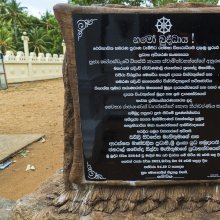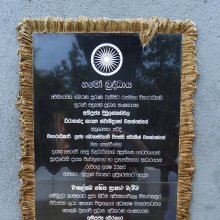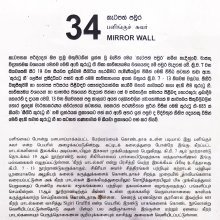Dayaka, Dāyaka: 24 definitions
Introduction:
Dayaka means something in Buddhism, Pali, Hinduism, Sanskrit, Jainism, Prakrit, Marathi, Hindi. If you want to know the exact meaning, history, etymology or English translation of this term then check out the descriptions on this page. Add your comment or reference to a book if you want to contribute to this summary article.
Alternative spellings of this word include Dayak.
Images (photo gallery)
In Hinduism
Purana and Itihasa (epic history)
Source: archive.org: Shiva Purana - English TranslationDāyaka (दायक) refers to “that which causes” (e.g., that which makes the world miserable), according to the Śivapurāṇa 2.3.15 (“The penance and reign of Tārakāsura”).—Accordingly, as Brahmā narrated: “[...] At the same time, several phenomena of evil portent forboding misery and distress happened, when the son of Varāṅgī was born making the gods miserable. O dear, the phenomena of three varieties indicating great calamity and terrifying the worlds occurred in the sky, heaven and earth. I shall narrate them. With a terrifying noise, thunderbolts fell along with comets; shooting meteors rose up, making the world miserable [i.e., duḥkha-dāyakā]. [...]”.

The Purana (पुराण, purāṇas) refers to Sanskrit literature preserving ancient India’s vast cultural history, including historical legends, religious ceremonies, various arts and sciences. The eighteen mahapuranas total over 400,000 shlokas (metrical couplets) and date to at least several centuries BCE.
Shaivism (Shaiva philosophy)
Source: SOAS University of London: Protective Rites in the Netra TantraDāyaka (दायक) refers to “that which bestows (good luck and prosperity)”, according to the Netratantra of Kṣemarāja: a Śaiva text from the 9th century in which Śiva (Bhairava) teaches Pārvatī topics such as metaphysics, cosmology, and soteriology.—Accordingly, [verse 6.32cd-36ab]—“The Mantrin should worship the cakra with white flowers, after [he] has written the mantrarāṭ in grey with camphor dust, together with white sandalwood, and after he has applied milk and yellow pigment, O great goddess. [The mantrarāt] provides great protection and bestows good luck and prosperity (puṣṭasaubhāgya-dāyaka). [...]”.

Shaiva (शैव, śaiva) or Shaivism (śaivism) represents a tradition of Hinduism worshiping Shiva as the supreme being. Closely related to Shaktism, Shaiva literature includes a range of scriptures, including Tantras, while the root of this tradition may be traced back to the ancient Vedas.
Shaktism (Shakta philosophy)
Source: Google Books: ManthanabhairavatantramDāyaka (दायक) [=dāya?] refers to “that which gives (success)”, according to verse 11.39-45 of the Kularatnoddyota, one of the earliest Kubjikā Tantras.—Accordingly, [as the Goddess addresses Ādinātha ]: “I have seen this unique miracle which inspires wonder. Thus, you have attained another birth from the belly of the fish. This, your excellent spiritual emanation, is graced with the name Matsyendra and this will be your great fame on the surface of the earth. Beloved, this is your lineage which goes by the name Pūrvāmnāya. It is like the reflection of the Western path. Adorned with the six divisions Ānanda, Āvali (and the rest), it gives success (siddhi-dāyaka)”.

Shakta (शाक्त, śākta) or Shaktism (śāktism) represents a tradition of Hinduism where the Goddess (Devi) is revered and worshipped. Shakta literature includes a range of scriptures, including various Agamas and Tantras, although its roots may be traced back to the Vedas.
Yoga (school of philosophy)
Source: ORA: Amanaska (king of all yogas): A Critical Edition and Annotated Translation by Jason BirchDāyaka (दायक) refers to “that which bestows the (supernatural powers)”, according to the Amanaska Yoga treatise dealing with meditation, absorption, yogic powers and liberation.—Accordingly, as Īśvara says to Vāmadeva: “[...] There is no transition to the no-mind state because of piercing [Cakras, knots, etc.] with lower and upper Kuṇḍalinī. Simply by [constant] immersion [of the mind in the internal gaze of Śāmbhavī Mudrā], this yoga bestows the supernatural powers (siddhi-dāyaka). [...]”.

Yoga is originally considered a branch of Hindu philosophy (astika), but both ancient and modern Yoga combine the physical, mental and spiritual. Yoga teaches various physical techniques also known as āsanas (postures), used for various purposes (eg., meditation, contemplation, relaxation).
In Buddhism
Theravada (major branch of Buddhism)
Source: Dhamma Dana: Pali English GlossaryM (Donor). Benefactor of the sangha. The dayaka is a person who regularly helps bhikkhus in their practice, study and teaching of the dhamma.
To do so, he offers, according to his capabilities, to one or several bhikkhus, what they need. A bhikkhu can make his needs known to a dayaka only if the later has expressly requested the former to inform him of his requirements. A dayaka could also perfectly well offer some food, robes, soap, a lodging, a pagoda or anything else enabling others to come to know or know the dhamma.
See also: The dayakas and the kappiyas
Theravāda is a major branch of Buddhism having the the Pali canon (tipitaka) as their canonical literature, which includes the vinaya-pitaka (monastic rules), the sutta-pitaka (Buddhist sermons) and the abhidhamma-pitaka (philosophy and psychology).
Mahayana (major branch of Buddhism)
Source: Wisdom Library: Maha Prajnaparamita SastraDāyaka (दायक) refers to the “giver (of gifts)”, according to Mahāprajñāpāramitāśāstra (chapter 19).—Accordingly, “Furthermore, the reward (vipāka) attributed to generosity increases in the following cases:—[...] When the giver (dāyaka) and the receiver (pratigrāhaka) are both virtuous. [Note: if these are the Buddhas and Bodhisattvas who give out of loving-kindness (maitrīcitta), they are the ‘donors’; but if it is to the Buddhas and Bodhisattvas, the Arhats and Pratyekabuddhas that one is giving, they are the ‘recipients’. [...]”.

Mahayana (महायान, mahāyāna) is a major branch of Buddhism focusing on the path of a Bodhisattva (spiritual aspirants/ enlightened beings). Extant literature is vast and primarely composed in the Sanskrit language. There are many sūtras of which some of the earliest are the various Prajñāpāramitā sūtras.
Tibetan Buddhism (Vajrayana or tantric Buddhism)
Source: Brill: Śaivism and the Tantric Traditions (tantric Buddhism)Dāyaka (दायक) refers to a “donor”, according to the Bhūśalyasūtrapātananimittavidhi section of Jagaddarpaṇa’s Ācāryakriyāsamuccaya, a text within Tantric Buddhism dealing with construction manual for monasteries etc.—Accordingly, “[...] Having praised [the cord] with the sounds of a bell, auspicious song, conch shell, and bamboo flute, the donor (dāyaka) should offer guest water [to the cord] together with jewels, gold, and fragrant flowers, which are blooming and beautiful, and mixed with the juice extracted from the sprouts of the airandhrīkara”.
Source: OSU Press: Cakrasamvara SamadhiDāyaka (दायक) refers to “granting” (success in everything), according to the Guru Mandala Worship (maṇḍalārcana) ritual often performed in combination with the Cakrasaṃvara Samādhi, which refers to the primary pūjā and sādhanā practice of Newah Mahāyāna-Vajrayāna Buddhists in Nepal.—Accordingly, “This, this here most excellent cloth, adorned with various colors, I give with the most excellent devotion, granting success in everything (sarvasampatti-dāyaka)”.

Tibetan Buddhism includes schools such as Nyingma, Kadampa, Kagyu and Gelug. Their primary canon of literature is divided in two broad categories: The Kangyur, which consists of Buddha’s words, and the Tengyur, which includes commentaries from various sources. Esotericism and tantra techniques (vajrayāna) are collected indepently.
In Jainism
General definition (in Jainism)
Source: The University of Sydney: A study of the Twelve ReflectionsDāyaka (दायक) refers to “(that which) impart (suffering)”, according to the 11th century Jñānārṇava, a treatise on Jain Yoga in roughly 2200 Sanskrit verses composed by Śubhacandra.—Accordingly, “All the connections arising from the ocean of life are the abode of bad luck for human beings [and] thus, in the end, [the connections] are exceedingly tasteless [nīrasāḥ; var.: duḥkhadāyakāḥ]”.
Synonyms: Siddhida.

Jainism is an Indian religion of Dharma whose doctrine revolves around harmlessness (ahimsa) towards every living being. The two major branches (Digambara and Svetambara) of Jainism stimulate self-control (or, shramana, ‘self-reliance’) and spiritual development through a path of peace for the soul to progess to the ultimate goal.
Languages of India and abroad
Pali-English dictionary
Source: BuddhaSasana: Concise Pali-English Dictionarydāyaka : (m.) giver; supporter.
Source: Sutta: The Pali Text Society's Pali-English DictionaryDāyaka, (Sk. dāyaka, dā as in dadāti & dāna) (adj.) giving, bestowing, distributing, providing (usually —°); (n.) a donor, benefactor; a munificent person M.I, 236 sq.; A.I, 26, 161; II, 64, 80; III, 32, 336; IV, 81; Sn.p. 87; It.19 (ito cutā manussattā saggaṃ gacchanti dāyakā); J.V, 129 (kaṇḍa°); Pv.I, 11 sq.; 12; 42; 55; DA.I, 298; PvA.113 (=dada); Miln.258 (°ānaṃ dakkhiṇā); Sdhp.276.—f. dāyikā Vin.II, 216 (bhikkhā°), 289 (khīrassa).—adāyaka a stingy person, one who neglects almsgiving (cp. adānasīla) Pv.I, 119; f. °ikā Pv.I, 93. (Page 319)

Pali is the language of the Tipiṭaka, which is the sacred canon of Theravāda Buddhism and contains much of the Buddha’s speech. Closeley related to Sanskrit, both languages are used interchangeably between religions.
Marathi-English dictionary
Source: DDSA: The Molesworth Marathi and English Dictionarydāyaka (दायक) [or दायी, dāyī].—a S That gives, bestows, confers, yields, renders. In comp. as sukhadāyaka, duḥkhadā0, śubhadā,0 kalyāṇadā,0 sampattidā,0 maṅgaladā,0 mōkṣadā0. 2 (Poetry.) Liberal, munificent. 3 An heir.
Source: DDSA: The Aryabhusan school dictionary, Marathi-Englishdāyaka (दायक).—a That gives, bestows, con. fers, &c. In comp. as sukhadāyaka (Poetry) Liberal, munificent.
Marathi is an Indo-European language having over 70 million native speakers people in (predominantly) Maharashtra India. Marathi, like many other Indo-Aryan languages, evolved from early forms of Prakrit, which itself is a subset of Sanskrit, one of the most ancient languages of the world.
Sanskrit dictionary
Source: DDSA: The practical Sanskrit-English dictionaryDāyaka (दायक).—a. (-yīkā f.) [दा-ण्वुल् (dā-ṇvul)] Giving, granting, bestowing, &c. (at the end of comp.); उत्तर°, पिण्ड° (uttara°, piṇḍa°), &c.
-kaḥ 1 An heir, inheritor.
2) A donor.
Source: Cologne Digital Sanskrit Dictionaries: Shabda-Sagara Sanskrit-English DictionaryDāyaka (दायक).—mfn.
(-kaḥ-kā-kaṃ) Liberal, giving, a donor. E. dā to give, ṇvul aff.
Source: Cologne Digital Sanskrit Dictionaries: Benfey Sanskrit-English DictionaryDāyaka (दायक).—i. e. 1. dā + aka, adj. Giving, [Mānavadharmaśāstra] 9, 271; a giver, Mahābhārata 3, 13245.
Source: Cologne Digital Sanskrit Dictionaries: Cappeller Sanskrit-English DictionaryDāyaka (दायक).—1. [feminine] yikā giving, granting, imparting, effecting, producing (mostly —°).
--- OR ---
Dāyaka (दायक).—2. [adjective] heir, kinsman.
Source: Cologne Digital Sanskrit Dictionaries: Monier-Williams Sanskrit-English Dictionary1) Dāyaka (दायक):—[from dā] 1. dāyaka mf(ikā)n. giving, granting, bestowing
2) [v.s. ...] imparting, communicating, uttering, telling
3) [v.s. ...] fulfilling, causing, effecting, [Mahābhārata; Harivaṃśa; Daśakumāra-carita etc.] (generally ifc.; cf. agni-, uttara-, jñāna-viṣa-).
4) [from dā] 2. dāyaka m. heir, kinsman, [Gṛhya-sūtra]
Source: Cologne Digital Sanskrit Dictionaries: Yates Sanskrit-English DictionaryDāyaka (दायक):—[(kaḥ-kā-kaṃ) a.] Liberal.
Source: DDSA: Paia-sadda-mahannavo; a comprehensive Prakrit Hindi dictionary (S)Dāyaka (दायक) in the Sanskrit language is related to the Prakrit word: Dāyaga.
[Sanskrit to German]
Sanskrit, also spelled संस्कृतम् (saṃskṛtam), is an ancient language of India commonly seen as the grandmother of the Indo-European language family (even English!). Closely allied with Prakrit and Pali, Sanskrit is more exhaustive in both grammar and terms and has the most extensive collection of literature in the world, greatly surpassing its sister-languages Greek and Latin.
Hindi dictionary
Source: DDSA: A practical Hindi-English dictionaryDāyaka (दायक) [Also spelled dayak]:—(nm) a donator; a suffix meaning a giver (e.g. [phaladāyaka, lābhadāyaka]).
...
Kannada-English dictionary
Source: Alar: Kannada-English corpusDāyaka (ದಾಯಕ):—
1) [noun] a man who gives, donates; a donor.
2) [noun] a kinsman eligible for a share in a property; a heir or co-heir.
3) [noun] a slayer of enemies; a warrior; a soldier.
Kannada is a Dravidian language (as opposed to the Indo-European language family) mainly spoken in the southwestern region of India.
See also (Relevant definitions)
Starts with: Dayakala, Dayakara, Dayakata, Dayakataksha, Dayakati.
Ends with (+151): Abbhanjanadayaka, Abhidayaka, Abhishtadayaka, Adharadayaka, Agnidayaka, Ajinadayaka, Alambanadayaka, Aluvadayaka, Amandaphaladayaka, Ambadayaka, Ambayagu Dayaka, Anandadayaka, Anulepadayaka, Anulomadayaka, Arakkhadayaka, Aramadayaka, Ashadayaka, Audayaka, Avantaphaladayaka, Ayagadayaka.
Full-text (+59): Dayika, Uttaradayaka, Kantidayaka, Agnidayaka, Dapaka, Tambuladayaka, Bhaktadayaka, Vishadayaka, Sukhadayaka, Saukhyadayaka, Dayahara, Pradayakatva, Nipacca-vadin, Dayin, Varadayaka, Karadayaka, Dayakata, Bhushanadayaka, Maladayaka, Samadapaka.
Relevant text
Search found 16 books and stories containing Dayaka, Dāyaka; (plurals include: Dayakas, Dāyakas). You can also click to the full overview containing English textual excerpts. Below are direct links for the most relevant articles:
Bhakti-rasamrta-sindhu (by Śrīla Rūpa Gosvāmī)
Verse 2.1.204 < [Part 1 - Ecstatic Excitants (vibhāva)]
Verse 3.1.10 < [Part 1 - Neutral Love of God (śānta-rasa)]
Verse 2.1.40 < [Part 1 - Ecstatic Excitants (vibhāva)]
Garga Samhita (English) (by Danavir Goswami)
Verse 6.20.1 < [Chapter 20 - In the Description of the Second Fort, the Glories of Indra-tīrtha, etc.]
Verse 8.13.64 < [Chapter 13 - A Thousand Names of Lord Balarāma]
Maha Prajnaparamita Sastra (by Gelongma Karma Migme Chödrön)
Introduction (Why is the donor non-existent) < [Part 13 - Non-existence of the donor]
Part 11 - Non-existence of the thing given < [Chapter XX - The Virtue of Generosity and Generosity of the Dharma]
I. Definition of sympathetic joy (anumodanā) < [Part 1 - Surpassing the high qualities of the Śrāvakas]
The Great Chronicle of Buddhas (by Ven. Mingun Sayadaw)
Part 3 - An Account of The Lay Devotee Brahmin Pancagga Dayaka < [Chapter 26 - The Buddha’s Eighth Vassa at the Town of Susumaragira]
Six and Five kinds of Wrong Livelihood (micchājiva) < [Chapter 6 - On Pāramitā]
The Story of Venerable Mahā-Mitta < [Chapter 6 - On Pāramitā]
Apadana commentary (Atthakatha) (by U Lu Pe Win)
Commentary on Biography of the thera Lasuṇadāyaka < [Chapter 4 - Kuṇḍadhānavagga (section on Kuṇḍadhāna)]
The Doctrine of Paticcasamuppada (by U Than Daing)


